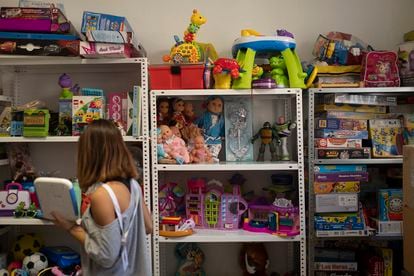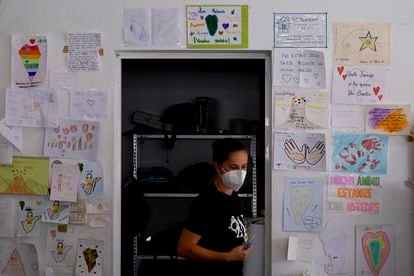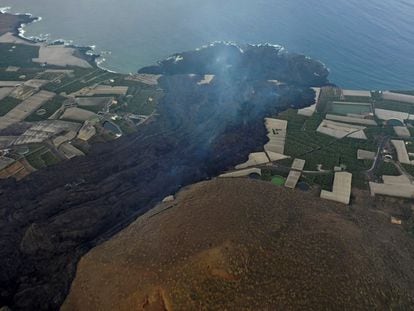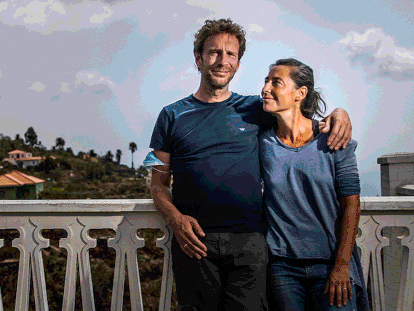Falling ash and closed schools: How La Palma’s volcano is affecting children
Classes are still suspended in the affected areas and parents are worried about the effect the noise and destruction is having on the emotional lives of their kids
/cloudfront-eu-central-1.images.arcpublishing.com/prisa/7GVRPECFWNDG3LUSTPZDSROJPM.jpg)
Aurelio Acevedo is watching the volcano from the garden of his home on La Palma, in Spain’s Canary Islands, with his daughters Leila, 13, and Matilde, seven. A biologist by trade, he was born right here on La Palma in 1974, three years after the eruption of another volcano, the Teneguía – an event that shaped islanders’ collective memory and that was, until September 19 of this year, the last volcanic eruption on La Palma.
Until now, Acevedo had not seen the spectacular devastation caused by the lava and ash first-hand, and perhaps that is why he is concerned that somehow the lives of his daughters, along with those of hundreds of children in El Paso, Los Llanos de Aridane and Tazacorte will be affected by what they are living through. “The other day I asked the girls to write an essay about what they were feeling, so that they could get it off their chests,” he says, as he walks with his daughters down a street in El Paso.
Asked what they like about the volcano, Matilde, the youngest, says: “Drawing it and watching it.”
“I like watching the volcano,” says Leila. “But not that much because it is destroying too many houses and too many families.”
“That’s true,” her little sister agrees solemnly.
A few meters away, Geseina is holding her four-year-old daughter by the hand. She is going to ask for gluten-free food from the municipality’s social services because her family’s domestic life has been turned upside down in the past 15 days. “We had just bought a house because things were starting to look up for us,” says Geseina. “My husband had a banana plantation and we got a mortgage. Then I became unemployed, the lava wiped out my husband’s plantation and now he offers his services on a daily basis transporting other people’s bananas. To make matters worse, they won’t let him enter [his plantation] for safety reasons, so the fruit is spoiling and there’s no money coming in. She is still very young,” she adds, indicating her daughter, “but all of us parents are worried that the general despair might affect them.”

A young grandmother, holding the hand of a girl who looks about eight years old, says her other granddaughter has become panicked by her bedroom as she can see the volcano from its window, and also because of the constant noise and fire. Consequently, the family has decided to leave El Paso. “We’ll see what happens when this is over,” she says.
There are streets in El Paso from which the volcano cannot be seen, but there are none that escape the sound of its fury, its sudden outbursts of anger; and there’s little hope of respite from the decibel levels that shatter the small hours of the morning. On top of the noise is the ash that continues to rain down on the streets and schoolyards – not usually in the shape of a downpour as on September 30, but as an intermittent drizzle. Meanwhile, hundreds of children in the affected areas are still not going to school; many of them are simply playing a game of wait-and-see in their homes or in emergency shelters.
In the meantime, a number of youngsters have become involved in volunteering. The town councilor for education, Teresa Hernández Díaz, has got together a group of students who have replaced their classes at El Paso Secondary School for jobs that keep them fully occupied, such as sorting through the toys that, along with food, clothes and shoes of all shapes and sizes, continue to arrive from both the other islands in the archipelago and from mainland Spain.
One of the most active youths is Marcos, 17, who is in his last year of school. He says that the activity helps him to keep the sadness at bay. “I feel terrible inside because when you find out that someone you don’t know really well has lost their home, it hurts,” he says. “But when it happens to someone close to you, you’re devastated. I am very worried about a classmate because his family has lost everything.” Lola, 16, says that at first she was afraid, but when she saw that nothing could be done about the volcano, she decided to help. “I would ask people to stop sending toys and also clothes because there are plenty of them,” she says. “Now they should send money, even if it’s just one euro, to buy more expensive but necessary things like washing machines.”

As he watches the evolution of the volcano’s eruption from his vegetable patch, Acevedo says that he is concerned about the psychological impact on the children from the stress of the incessant hammering of the volcano, the uncertainty about the dangers that lie in the island’s subsoil and the economic repercussions. “I myself am worried though I don’t express my concerns. But every so often, when I’m making lunch, or looking at the computer, I get up and go to the vegetable garden to look at the volcano. You are tense even though you don’t want to be and don’t show it. But inside I carry the same tension all of us adults share and that perhaps the girls also have and don’t know how to express.” All this tension builds into suppressed emotion that suddenly erupts at the most unexpected moments.
The solidarity of children from elsewhere helps. On October 5, a shoebox arrived at the El Paso City Hall donation point filled with letters from boys and girls from Santa Cruz de Tenerife who wanted to send messages of encouragement and gifts to the children of La Palma. The bundle is addressed “To whoever receives these letters.” And the postscript reads: “We would like you to let us know on our cousin Sheila’s Facebook page if you have received them.”












































